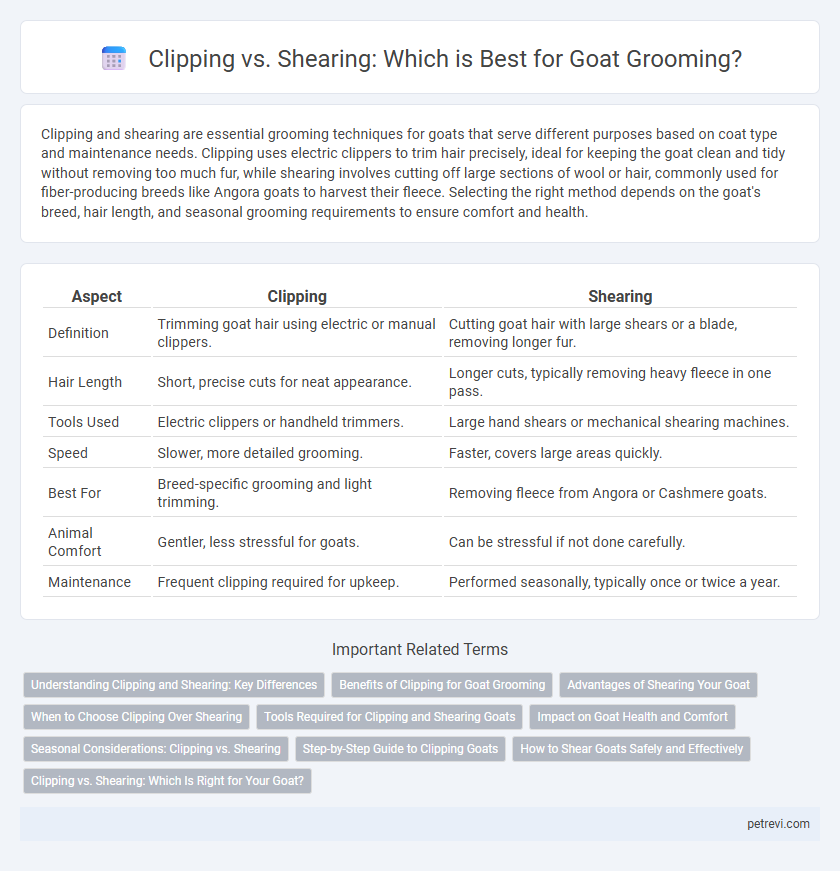Clipping and shearing are essential grooming techniques for goats that serve different purposes based on coat type and maintenance needs. Clipping uses electric clippers to trim hair precisely, ideal for keeping the goat clean and tidy without removing too much fur, while shearing involves cutting off large sections of wool or hair, commonly used for fiber-producing breeds like Angora goats to harvest their fleece. Selecting the right method depends on the goat's breed, hair length, and seasonal grooming requirements to ensure comfort and health.
Table of Comparison
| Aspect | Clipping | Shearing |
|---|---|---|
| Definition | Trimming goat hair using electric or manual clippers. | Cutting goat hair with large shears or a blade, removing longer fur. |
| Hair Length | Short, precise cuts for neat appearance. | Longer cuts, typically removing heavy fleece in one pass. |
| Tools Used | Electric clippers or handheld trimmers. | Large hand shears or mechanical shearing machines. |
| Speed | Slower, more detailed grooming. | Faster, covers large areas quickly. |
| Best For | Breed-specific grooming and light trimming. | Removing fleece from Angora or Cashmere goats. |
| Animal Comfort | Gentler, less stressful for goats. | Can be stressful if not done carefully. |
| Maintenance | Frequent clipping required for upkeep. | Performed seasonally, typically once or twice a year. |
Understanding Clipping and Shearing: Key Differences
Clipping and shearing are essential methods in goat grooming, each serving distinct purposes based on the goat's fiber type and grooming needs. Clipping involves the precise trimming of hair or fiber, typically used for establishing an even length without removing all the fleece, whereas shearing removes the entire fleece in one stroke, primarily for fiber-producing breeds like Angora goats. Understanding these differences helps maintain goat health, optimize fiber quality, and ensure animal comfort during seasonal changes.
Benefits of Clipping for Goat Grooming
Clipping goat hair provides a clean and uniform coat, enhancing hygiene by reducing dirt and parasite buildup. It promotes better skin health by allowing airflow and preventing matting, which can cause discomfort and skin infections. Clipped goats also regulate body temperature more efficiently, improving overall comfort and productivity.
Advantages of Shearing Your Goat
Shearing your goat promotes better hygiene by removing heavy fleece that can trap dirt and parasites, reducing the risk of skin infections and infestations. It also helps regulate body temperature during warmer months, preventing overheating and ensuring goat comfort. This method encourages healthier skin and a cleaner coat compared to clipping, which may leave uneven patches and less thorough fur removal.
When to Choose Clipping Over Shearing
Clipping is ideal for goats requiring precise grooming around sensitive areas like the face, ears, and legs, or when preparing for shows where a neat appearance is essential. Choose clipping for smaller herds or individual goats as it offers control and reduces stress compared to full shearing. Clipping is also suitable during hot weather when removing only excess hair helps maintain proper body temperature without exposing the animal to harsh environmental elements.
Tools Required for Clipping and Shearing Goats
Clipping goats requires electric or battery-powered clippers with specialized goat grooming blades designed for precision and efficiency. Shearing goats demands powerful hand shears or electric shears equipped with coarse-toothed combs to handle thicker, denser fibers. Proper maintenance of blades and availability of replacement parts optimize grooming results and animal comfort.
Impact on Goat Health and Comfort
Clipping goats involves cutting hair close to the skin using electric clippers, reducing the risk of heat stress and parasites while minimizing skin abrasions. Shearing removes the entire fleece or hair layer, which can expose goats to cold temperatures and increase vulnerability to sunburn and insect bites if not timed appropriately. Proper grooming choice directly influences goat health by balancing thermal regulation and skin protection to enhance overall comfort.
Seasonal Considerations: Clipping vs. Shearing
Clipping goats is ideal for managing their coat during warmer months, allowing precise control over hair length and reducing heat stress. Shearing is preferred in cooler seasons to remove entire fleece quickly, promoting skin health and preparing goats for colder weather. Seasonal consideration dictates that clipping supports ventilation and hygiene in spring and summer, while shearing provides optimal protection and comfort as temperatures drop in fall and winter.
Step-by-Step Guide to Clipping Goats
Start goat grooming by selecting sharp, quality clippers designed specifically for the thick coat of goats to ensure a smooth cut. Begin clipping at the neck, moving steadily toward the rear while trimming in the direction of hair growth to avoid skin irritation or uneven cuts. Regularly clean the clipper blades to prevent clogging and check the goat's skin frequently for nicks or abrasions during the clipping process.
How to Shear Goats Safely and Effectively
To shear goats safely and effectively, use sharp, well-maintained electric clippers designed for animal grooming to minimize skin cuts and stress. Position the goat securely, trimming in the direction of hair growth while avoiding sensitive areas such as the udder and flanks. Regular breaks and calm handling reduce the risk of injury and promote a smooth, efficient shearing process essential for maintaining goat health and fiber quality.
Clipping vs. Shearing: Which Is Right for Your Goat?
Clipping and shearing are two primary methods for goat grooming, each serving different purposes to maintain goat health and comfort. Clipping uses electric clippers to trim hair closely and cleanly, ideal for precise grooming and removing dirt or parasites without stressing the goat. Shearing involves cutting off larger sections of wool or hair, suited for fiber-producing breeds like Angora goats, promoting airflow and preventing overheating during warmer months.
Clipping vs Shearing for Goat Grooming Infographic

 petrevi.com
petrevi.com